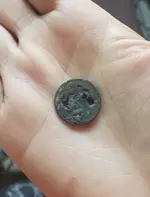gold chick
Full Member
- Joined
- Dec 28, 2019
- Messages
- 106
- Reaction score
- 176
- Golden Thread
- 0
- Location
- Texas Gulf Coast
- Detector(s) used
- Garrett AT Pro
- Primary Interest:
- Metal Detecting
- #1
Thread Owner
Hi there! So I am just starting out with metal detecting, here on the Gulf Coast of Texas.
I found a penny at the park, and it is dated 2015.
However, it is so extremely corroded beyond belief! How could a 2015 penny get so badly damaged?
It was at the park, mostly sandy soil.

It has two clear holes right thru the coin!!!
I found a penny at the park, and it is dated 2015.
However, it is so extremely corroded beyond belief! How could a 2015 penny get so badly damaged?
It was at the park, mostly sandy soil.

It has two clear holes right thru the coin!!!











